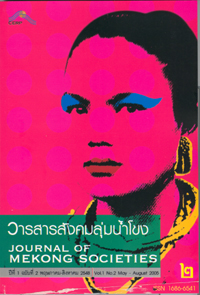Social Network of Lao Transnational Migrant Workers in Thailand
Main Article Content
Abstract
Thailand is well-known as a source of workers who engage intransnational migration. Less well recognized, at least outside Thailand, is the fact that the country also receives very large numbers of transnational migrants who move into the country in search of work. Most of these migrants are from the poorer neighbouring countries of Burma, Laos and Cambodia. That Thailand borders countries which have experienced later and less capitalist development and where there have been decades of political instability and war, has meant that, in recent years, has resulted in an increasing influx of migrants. Some of these have been refugees, but in recent years, the migrants have been in search of work and ways to improve their lives. This article makes an initial attempt to broaden our understanding of these more recent Lao migrants to Thailand, and gives particular attention to the social networks that facilitate their migration and influence their lives while in Thailand. The discussion in this article is based on data from a small survey conducted with these initially illegal migrants who appeared for registration with the Thai authorities in July 2004. This was part of a programme that was meant to regularize the use of migrant labour, through an amnesty that initially provided for temporary working permission. The study was conducted in five provincial areas, Nongkhai, Ubon Ratchathani, Chonburi, Khon Kaen and Surin. The study involved 276 Lao workers. Data collection was interview-based, using a questionnaire developed by the researchers. The interviews were conducted at the registration site, and with the consent of the respondents. The data from the interviews were compiled and analyzed with the SPSS program by using descriptive statistics. Additionally, more detailed and open-ended interviews of 1-2 hours were conducted with ten Lao workers to provide more in-depth information. Illegal transnational migrant workers are among the most vulnerable and most exploited groups of workers. Their illegal status places them in a position where they are often silenced and must accept unfair employment conditions. They are often not protected by the labour laws of the receiving countries. Socially, they live far from home, dislocated from their family, friends and community. Therefore, the extent, density and quality of social networks can be important as new relationships of work, friendship and trust are developed. Based on the survey of 276 Lao immigrants, we have found that limited but important social networks have developed. The social network that originates in the home community and links the workers to their family and home, is vital. It is this network that assists them to cross the border, find or arrange employment, remit parts of their earnings, and is expected to support their return. In other words, having social networks with people who have traveled to and worked in Thailand before is a major condition promoting a positive migration decision, and this is especially the case for women. As noted, these networks facilitate contacts with their family and in sending remittances home. This is because their illegal status limits access to formal financial services. This study has also indicated the gendered nature of the social networks. Womenûs decisions to migrate are strongly influenced by having family members or neighbours who have had a positive migration experience, and where these people can continue to support them while they are in Thailand. But men have wider social networks and can usually obtain more concrete support from their network than women do. In addition, more men can garner the support of close friends and co-workers, while women rely more on their original social network among relatives.


